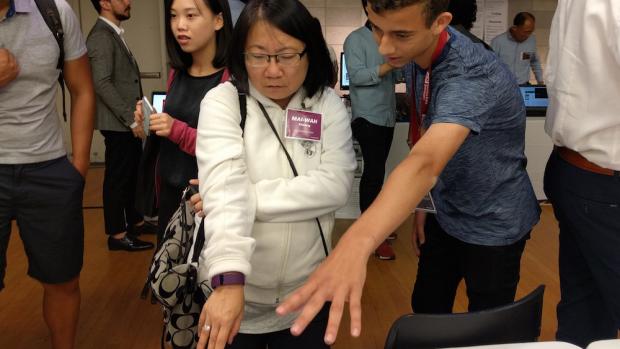Tandon Students Receive Awards for Tools to Improve Retail, Transportation, and Software Development

Three NYU Tandon teams received awards for their research at the NYC MediaLab Summit on September 22. The annual summit highlights innovative student research happening now at various New York City universities. Among the NYC MediaLab Summit events was the Demo Expo, where students presented their projects in areas ranging from game design to virtual reality to hundreds of tech industry professionals, businesses, and potential investors. Three Tandon teams secured second- and third-place prizes for their project demos.
Building stronger connections between developer and user
Fraida Fund and Caleb Smith-Salzberg won a second-place prize for their project, which allows developers to experience software or programs as an average user would, since many researchers typically test their applications using unrepresentative high-speed networks. Fund and Smith-Salzberg’s tool provides developers with data from sample U.S. household networks to understand how their software functions with varying connection speeds. Fund, a Ph.D. student in Electrical and Computer Engineering, hopes that developers and even Tandon professors and students will use this tool to both “improve the quality of their research and … generate realistic network configurations for their experiments.”
This project was a rare opportunity for Smith-Salzburg, who is a local high school student. This past summer, he participated in NYU Tandon’s Applied Research Innovations in Science and Engineering (ARISE) program, which brings together talented New York high school students with interests in STEM for an intensive seven-week academic and research program. Fund was both his program mentor and research partner on this project.
Data analysis to improve public transportation
Aline Bessa, Fernando Silva, and Rodrigo Nogueira — who are all Ph.D. students in Computer Science originally from Brazil — won a third-place prize for RioBusData, a tool that uses data from Rio de Janeiro’s GPS-equipped public buses to monitor and analyze outliers, or buses that appear to veer off schedule or route. RioBusData developed out of courses with Computer Science and Engineering professors Juliana Freire and Enrico Bertini. The students created the tool’s deep learning technique that can differentiate between an off-route bus and errors in the data. Silva, who grew up in Rio, recognized the usefulness of human input to their tool: “Since I lived my whole life [in Rio] it was easy for me to spot weird behaviors because I already knew most of these bus lines,” he said. The team also integrated a visual analytics component that allows an end user to view the bus routes and data more clearly.
While the tool was designed using data from Rio de Janeiro, RioBusData’s algorithms can be used by any city’s transportation or urban planning department to visualize their data and determine strategies for improvement to their bus system.
Comprehensive customer-recognition systems
Also garnering a third-place award were Xiaoran Ning, Yuanyi Xue, and Yilin Song — the brains behind Wikkit: Retail Analytics Solution, a customer recognition system geared towards small businesses hoping to create a more personalized shopping experience. Wikkit works through a combination of real-time image detection, recognition, and analysis to identify returning and unique customers and analyze their shopping habits, both of which help store owners in recognizing effective sales strategies and in adding a personal touch to a customer’s shopping experience. Ning, Xue, and Song aim for Wikkit to work like “magic” for the business owner; all of the data processing is done through Wikkit’s cloud service, which delivers user-friendly reports to the owner and sales associates.
Ning and Xue are recent doctoral graduates from Electrical and Computer Engineering, while Song is a current Ph.D. student in the department. Now a full-fledged startup, Wikkit began as a research project at Tandon under the guidance of Professor Yao Wang. “It’s only through her suggestions and support [that] our company is able to thrive,” Song said. With the added encouragement of the MediaLab award, and the attention received at the Demo Expo from vendors and businesses, Ning, Xue, and Song hope Wikkit will continue to grow in China and the United States.
Camila Ryder
Graduate School of Arts and Science
Master of Arts in English Literature, Class of 2018




